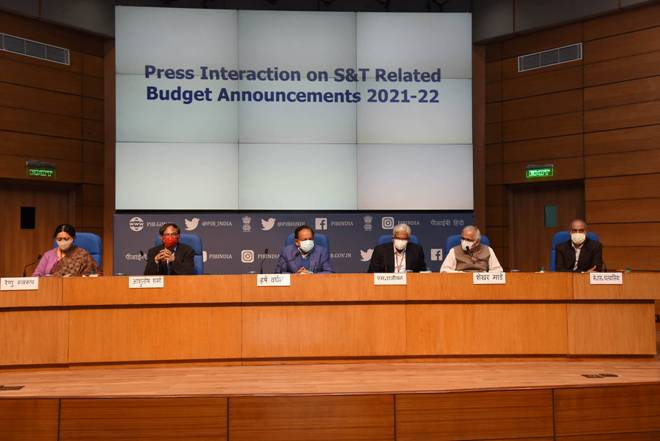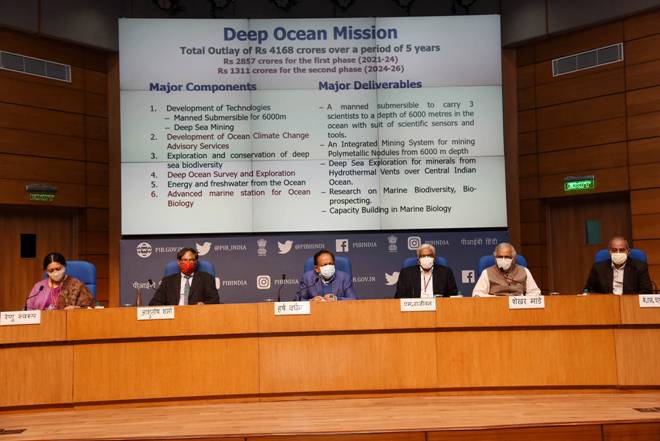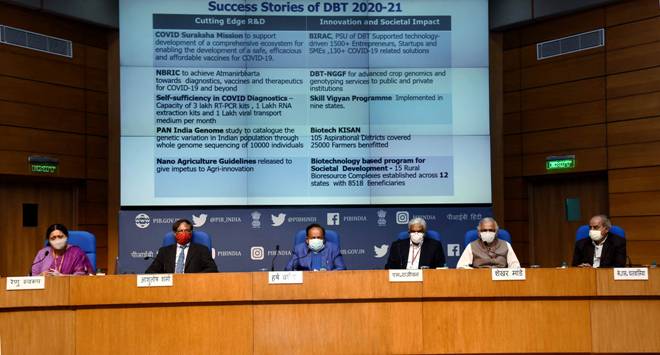There are various new schemes in this new budget which would further boost Science and Technology ecosystem in the country: Dr Harsh Vardhan
The Budget 2021includes several initiatives to promote science, technology and innovation with applications in the country. It is a forward looking budget to substantially boost support for R&D in the key identified areas of national priorities. These are also in line with the projections in the draft Science Technology and Innovation Policy 2021 put up for public consultations.
This includes a total allocation of Rs 50,000 crore over 5 years for the National Research Foundation, an autonomous body envisaged to support researchers working across several streams of S&T with special focus on universities. This will ensure that the overall research ecosystem of the country is strengthened with a focus on identified national-priority thrust areas.
Dr Harsh Vardhan, Minister for Health and Family Welfare, Science & Technology and Earth Sciences, said that there has been 30 per cent increase in budget of Ministry of Science & Technology and Earth Sciences put together for the year 2021-22 compared to the last year. “The last year has been a very challenging year due to the COVID-19 pandemic and science and technology has played a crucial role in tackling various problems caused by the COVID-19. There are various new schemes in this new budget which would further boost science and technology ecosystem in the country, reach its benefits to the people and help the country become a major force in S&T globally,” he added.
The budget also announced the launch of a Deep Ocean Mission with an outlay of more than 4,000 crore over five years to better understand this new realm which offers exceptional opportunities in mapping, exploring and utilizing the oceanic resources. The mission to be coordinated by the Ministry of Earth Sciences will cover deep ocean survey, development of technologies for exploration and harnessing of ocean resources as well as projects for the conservation and bio-prospecting of deep-sea biodiversity.
The budget also declared setting up of umbrella structures in nine cities for building better synergies among R&D institutions, Universities and Colleges supported by the government while also retaining their internal autonomy. This will be coordinated by the Ministry of Education, and a Glue Grant will be set aside for this purpose. The Department of Biotechnology is implementing the URJIT clusters (University Research Joint Industry Translation Clusters) which are being set up in 10 locations as per the Budget Announcement in February 2020. These will complement the activities of the Umbrella Structures.
A National Language Translation Mission (NLTM) was announced, which will enable the translation of the wealth of governance-and-policy related knowledge on the internet to major Indian languages using technologies such as AI based Machine Translation together with traditional methods.
The launch of a Hydrogen Energy Mission by the Ministry of New and Renewable Energy was declared for generating hydrogen from green power sources, its storage, transport and utilization. The Department of Biotechnology is developing a Biomass to Hydrogen Mission which will be important from the R & D perspective. Department of Science & Technology and Council of Scientific & Industrial Research will also be contributing to this mission.
Delineating the achievements of the science Ministries, Prof Ashutosh Sharma, Secretary, Department of Science & Technology, said, “India is placed at 3rd among countries in scientific publication featured within the top 50 innovative economies globally reached 3rd position in terms of no of Ph.Ds, in size of higher education system as well as in terms of number of startups. On the whole, we are on the positive climb.”
Dr M. Rajeevan, Secretary, MoES, spoke about improvements in weather forecasting, gains for India’s agricultural workforce and fisherfolk communities and drinking water for Lakshadweep Islands, accurate prediction of tropical cyclones and fieldwork by disaster management agencies, commissioning of an urban flood early warning system in Mumbai, augmentation of Doppler Weather Radars over North West India and a very high-resolution operational air quality forecast model for Delhi.
Dr.Renu Swarup, Secretary, Department of Bio-technology spoke about mission COVID Suraksha which was announced with a provision of Rs 900 Cr for supporting development of a comprehensive ecosystem for enabling development of a safe, efficacious and affordable vaccine for COVID-19. “A total of 30 vaccines have been supported in which 6 are out and rest are in various stages of progress.
Dr.Shekhar C Mande, Secretary, DSIR and Director General, CSIR, said that India has received global attention and appreciation for the efficient and effective handling of COVID-19 pandemic. This has been owing to the all-round and focused efforts initiated, coordinated and steered by the Government of India.
This year the budget of Department of Biotechnology includes a Special AtmaNirbhar Package of Rs. 900 Crores for Mission COVID Suraksha – The Indian Vaccine Development Mission.



*****
NB/KGS/(DST Media Cell)